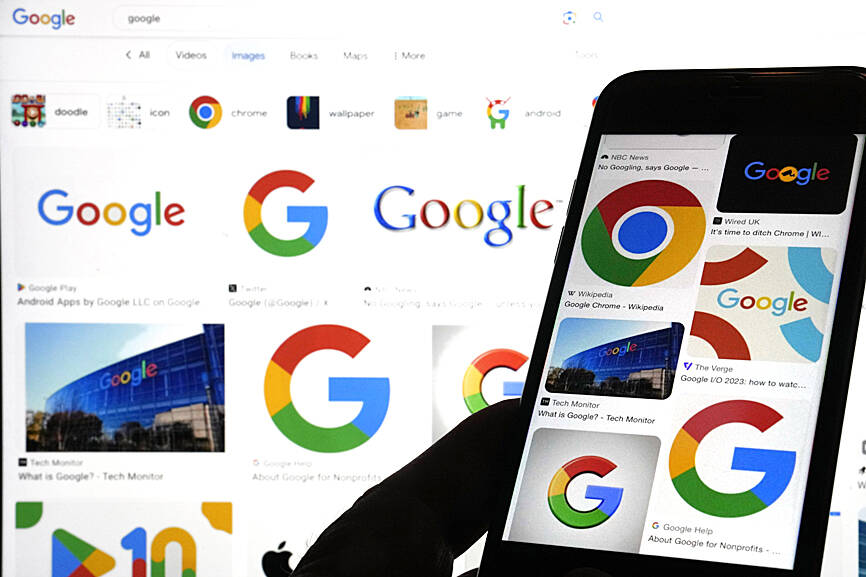A US judge on Monday handed Alphabet Inc’s Google a major legal blow, ruling in a landmark antitrust case that it has maintained a monopoly with its dominant search engine.
The court decision against a “big tech” giant could alter how the sector operates
US District Court Judge Amit Mehta found that Google had a monopoly for search and for text advertisements through exclusive distribution agreements that made it the “default” option that people were likely to use on devices.

Photo: AP
“After having carefully considered and weighed the witness testimony and evidence, the court reaches the following conclusion: Google is a monopolist, and it has acted as one to maintain its monopoly,” Mehta wrote in his ruling.
The Internet behemoth “has a major, largely unseen advantage over its rivals: default distribution,” he wrote.
The antitrust trial pitting US prosecutors and nearly a dozen states against Google ended in May.
At the heart of the government’s case was the massive payments made by Google to Apple Inc and other companies to keep its world-leading search engine as the default on iPhones, Web browsers and other products.
US Department of Justice lawyers argued that Google achieved and perpetuated its dominance — and strangled rivals — through these default deals that also expanded to Samsung Electronics Co and other device makers.
“This victory against Google is a historic win for the American people,” US Attorney General Merrick Garland said. “No company — no matter how large or influential — is above the law.”
Google would appeal the verdict, Alphabet global affairs president and chief legal officer Kent Walker said.
Walker pointed out that Mehta concludes Google is the industry’s highest-quality search engine, particularly on mobile devices.
“Given this, and that people are increasingly looking for information in more and more ways, we plan to appeal,” Walker said. “As this process continues, we will remain focused on making products that people find helpful and easy to use.”
It remained to be seen what remedies or damages the judge might order in the case.
In one possible good sign for Google, Mehta concluded in his ruling that the technology titan’s contravention of the US Sherman Antitrust Act did not have “anticompetitive effects.”
“Google’s loss in its search antitrust trial could be a huge deal — depending on the remedy,” Emarketer senior analyst Evelyn Mitchell-Wolf said.
“A forced divestiture of the search business would sever Alphabet from its largest source of revenue,” she said.
Even losing the option of making exclusive deals to be the default option on browsers, smartphones or computers would hurt Google, she added.
Google’s search business would be hampered as generative artificial intelligence wielded by Microsoft Corp’s Bing and OpenAI’s budding “SearchGPT” ramp up competition.
“The biggest winner from today’s ruling isn’t consumers or little tech, it’s Microsoft,” Chamber of Progress CEO Adam Kovacevich said. “Microsoft has underinvested in search for decades, but today’s ruling opens the door to a court mandate of default deals for Bing.”

The DBS Foundation yesterday announced the launch of two flagship programs, “Silver Motion” and “Happier Caregiver, Healthier Seniors,” in partnership with CCILU Ltd, Hondao Senior Citizens’ Welfare Foundation and the Garden of Hope Foundation to help Taiwan face the challenges of a rapidly aging population. The foundation said it would invest S$4.91 million (US$3.8 million) over three years to foster inclusion and resilience in an aging society. “Aging may bring challenges, but it also brings opportunities. With many Asian markets rapidly becoming super-aged, the DBS Foundation is working with a regional ecosystem of like-minded partners across the private, public and people sectors

Taiwan Semiconductor Manufacturing Co (TSMC, 台積電) has secured three construction permits for its plan to build a state-of-the-art A14 wafer fab in Taichung, and is likely to start construction soon, the Central Taiwan Science Park Bureau said yesterday. Speaking with CNA, Wang Chun-chieh (王俊傑), deputy director general of the science park bureau, said the world’s largest contract chipmaker has received three construction permits — one to build a fab to roll out sophisticated chips, another to build a central utility plant to provide water and electricity for the facility and the other to build three office buildings. With the three permits, TSMC

BREAKTHROUGH TECH: Powertech expects its fan-out PLP system to become mainstream, saying it can offer three-times greater production throughput Chip packaging service provider Powertech Technology Inc (力成科技) plans to more than double its capital expenditures next year to more than NT$40 billion (US$1.31 billion) as demand for its new panel-level packaging (PLP) technology, primarily used in chips for artificial intelligence (AI) applications, has greatly exceeded what it can supply. A significant portion of the budget, about US$1 billion, would be earmarked for fan-out PLP technology, Powertech told investors yesterday. Its heavy investment in fan-out PLP technology over the past 10 years is expected to bear fruit in 2027 after the technology enters volume production, it said, adding that the tech would

RUN IT BACK: A succesful first project working with hyperscalers to design chips encouraged MediaTek to start a second project, aiming to hit stride in 2028 MediaTek Inc (聯發科), the world’s biggest smartphone chip supplier, yesterday said it is engaging a second hyperscaler to help design artificial intelligence (AI) accelerators used in data centers following a similar project expected to generate revenue streams soon. The first AI accelerator project is to bring in US$1 billion revenue next year and several billion US dollars more in 2027, MediaTek chief executive officer Rick Tsai (蔡力行) told a virtual investor conference yesterday. The second AI accelerator project is expected to contribute to revenue beginning in 2028, Tsai said. MediaTek yesterday raised its revenue forecast for the global AI accelerator used